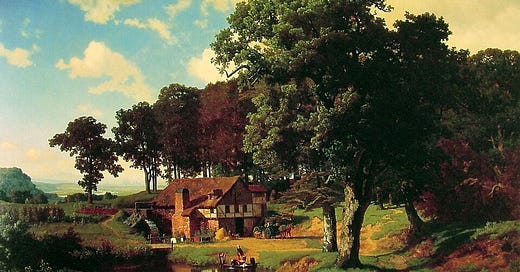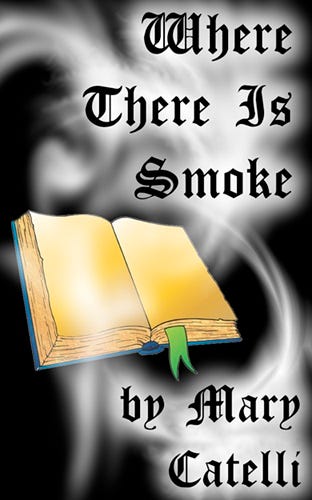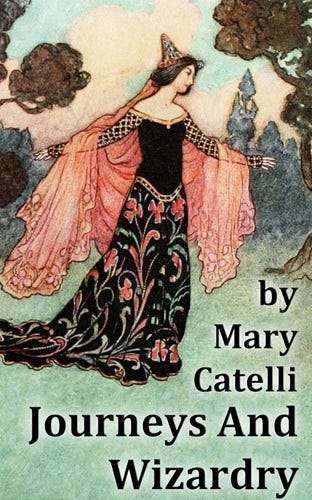So you've decided that your world has magic and technology both. No silly contrived reasons why magic doesn't function here1, or technology there2.
Except that your magical world doesn't have high technology. Not such much steam power is out. It operates at a medieval level, even.
No problem!
As long as you don't make any technology from the outside break as soon as it enters it -- including if you don't have the technology enter it from the outside at all -- you're all set.
After all, for millennia, people lurched along with primitive technology. Knapping flint. Using copper. Developing bronze and discovering you really needed to use tin and not arsenic to make it.
Technological developments increased only slowly, between lack of surplus energy and material to apply to it, want of curiosity through malnourishment and exhaustion, and a prudent wariness of changing anything when they were always so close to starvation.
In some ways, magic might mitigate this by providing more surplus so that there could be more scholars.
In other ways, magic might aggravate it by supplying what technology could also do. Why risk antibiotics when you could curse the bacteria to death?
Or perhaps they just learned to curse the disease, and how to diagnose it, and when the patient instead needed to be built up (from nutritional deficiencies).
This can, in fact, be a great occasion of fun. Randall Garrett, in his Lord Darcy mysteries, had the wizards lament the ignorant and superstitious, who resort unlicensed wizards, who would go and prescribe foxglove for heart conditions, when there was no symbolic correspondence at all. Bread mold for infections, willow bark for headaches, all superstition because these do not fit their paradigm.
Perhaps such technological developments as they have are closely interrelated with magical developments. Their sailing ships did not develop in terms of coping with the winds they had, but with conjuring up winds.
Or perhaps with the development of counter-magic. Merchant princes who want to keep their trade exclusive laid down bands where only their spells could conjure up winds. Dealing with this could involve espionage to steal their magic, or reverse-engineering the spells, or perhaps developing spells that would conjure up ocean currents instead, but perhaps they develop sails that operate on natural winds instead.
If magic can be detected, technological advances would, in fact, help.
If they were made. Many regions have suffered for eras because no one made a highly useful invention for no visible reason. Therefore, a medieval-ish level is still feasible.
Even when it occurs, it's apt to be slow. One of the quickest ways to break my suspension of disbelief is advances that are too rapid, and too neat. This is a form of knowing the ending.3 You may need to research what the false starts and dead ends are.
Then, of course, there's always the possibility that magic and technology interact badly. That the waste products of a technological process will offend the local sylphs and undines, perhaps.
Though before you go hog-wild on that, remember that wood smoke is a pollutant. Its combustion is imperfect, so it emits a lot of compounds more complex than carbon dioxide and water. Hence the smell. However pleasant we find it (at least in small doses), wood smoke is a pollutant. Do not make the sylphs so touchy that the people can't use fire unless you are prepared to work around that. Though you may be able to drag in salamanders to help.
(Fire is essential because cooked food provides the nutrition necessary for intellectual work. Unless, of course, you provide magical food that is sufficient when raw.)
All sorts of fun and games are possible in this.
Moe Lane, in his post-apocalyptic high-fantasy North America, works around it by having gunpowder be vulnerable to spells that the wizards learned very quick after the apocalypse. Advanced magic can make some technologies problems in their own right.
Or perhaps you can make enchanted weapons with the restriction that the part that hits the foe has be the part that is enchanted. So swords are fine. Arrows are iffy but feasible because usually they can be retrieved (if you win). Shotguns and muskets need a way to pull the lead from the body. Modern guns would need each cartridge enchanted individually and get one use.
That would inspire people to all sorts of considerations.
I myself made a story turn on such considerations about gunpowder, in the short story Where There Is Smoke, available at Amazon, Barnes & Noble, Kobo, Apple Books, and Smashwords.
If you want it in paper form -- or with other stories -- it's in Journeys and Wizardry. Available at Amazon, Barnes & Noble, Kobo, Apple Books, Everand, and Smashwords.
see
Technology vs. Magic -- Really?
One thing in world-building is that a lot of writers -- particularly those with cross-world travel in their worlds -- say that magic does not work in technological worlds, just as technology does not work in the magical world. Just because the world's technological.
See
Magic vs Technology -- Really?
One thing in world-building is that a lot of writers -- particularly those with cross-world travel in their worlds -- say that just as magical does not work in mundane worlds, so too does "technology" not work in the magical world. Just because the world's magical. Or, in a single world, the presence of magic causes technology to fail.
See
In My Ending Is My Beginning -- I Hope
You have it in hand, the triumphant ending, the glorious way the hero will defeat the villain and usher in the age of gold where he can marry his love interest in peace.










I have developing technology in my stories, but still early. Magic is rare in most places and each wizard has limited abilities, so technology is highly valued as well. Telescopes had just been invented. One old wizard uses a magnifying glass to help him read smaller print (on magic amulets). The two work together seamlessly at this tech and magic level. This allows the story to concentrate on the human interactions with tech and magic as just tools they use to achieve their goals.
"In other ways, magic might aggravate it by supplying what technology could also do. Why risk antibiotics when you could curse the bacteria to death?"
Would a world where magic is the modus operandi of all things even have bacteria?
Would the bacterial life have their own magic attack response, a magic of their own to survive against such curses?
If there were no bacteria, what would act in their place?